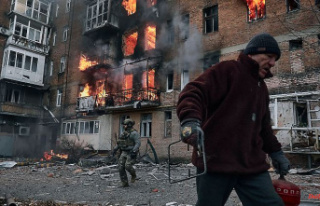A research network makes gruesome discoveries at the EU border. Accordingly, there are secret prisons in which refugees are locked up for days without water and food. The Bulgarian and Hungarian authorities deny the allegations.
According to media reports, there are secret prisons at the EU's external borders where asylum seekers are locked up and often mistreated. According to a report by the ARD magazines "Monitor" and "Spiegel" as well as the international media Lighthouse Reports, Sky News, Le Monde, Domani, SRF and RFE/ RL Bulgaria.
In the course of the research cooperation, it was possible for the first time to prove the existence of such places, including a barred, dilapidated shed on the premises of a Bulgarian border police station, it said. Covert footage shows how several people have to stand on the ground surrounded by rubbish until they are taken to cars and driven away.
Citing statements from refugees, it is said that asylum seekers are sometimes locked up in the shed for several days without water and food. The police then bring the people back to the border and force them to return to Turkey.
The legal scholar Constantin Hruschka from the Max Planck Institute in Munich classified this as illegal, according to the "Monitor". "It's an absolute violation of the law, because under no circumstances can I deviate from the ban on inhuman or degrading treatment," Hruschka said, according to the magazine. In addition, it is an unlawful deprivation of liberty.
According to the research network, the illegal detentions are apparently taking place directly under the eyes of the EU border protection agency Frontex. According to "Monitor", ten Frontex officers are also stationed at the Bulgarian border station. According to the director of Human Rights Watch Germany, Wenzel Michalski, they are complicit if they do not prevent such practices, so Frontex is "part of the problem".
Frontex wrote on request that Frontex officials would only support the Bulgarian border police in the area in monitoring the border. The conditions described, however, were not determined, but the information would be passed on. Bulgaria left questions about the research uncommented.
According to their own statements, the research cooperation in Hungary uncovered similar practices: recordings show how people were driven by the Hungarian border police with batons to shipping containers. Refugees reported being locked in such containers for many hours, again without water or food. They were then taken to the border crossing in buses and forced back to Serbia.
The Hungarian government therefore contradicted all allegations on request. The Hungarian officials would always comply with EU law, it said. When asked, the EU Commission said that the allegations of "misconduct" at the EU's external borders were taken very seriously. However, the respective states are responsible for compliance with fundamental rights at the external borders and for clarifying the allegations, according to Brussels.












